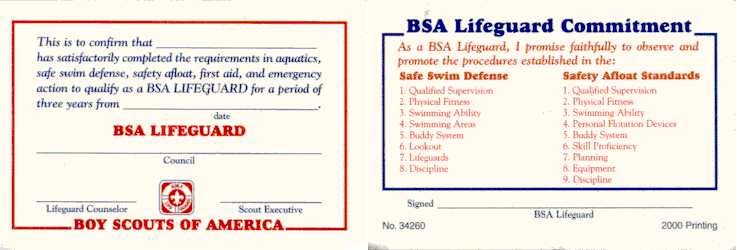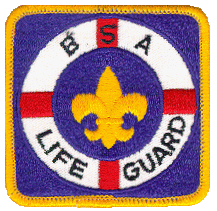SWIM TRUNKS EMBLEM
The BSA Lifeguard Patch is NOT worn on the Uniform.
It is worn on the right side of the swim trunks.
These requirements were revised effective on January 1, 2003.
To see the changes which were made in 2003, Click here.
The application for BSA Lifeguard can be downloaded from BSA's web site by clicking here.
- AGE REQUIREMENT
To enroll in the BSA Lifeguard course you must be at least 14 years of age or have completed the eighth grade. - PREREQUISITES
To enroll in the BSA Lifeguard course, you must- Swim 400 yards. Jump feetfirst into water over your head and swim continuously for 400 yards in a strong manner. The 400 yards shall consist of a minimum of 50 yards of elementary backstroke; 50 yards of breaststroke; 50 yards of front crawl or trudgen; and 50 yards of sidestroke.
- Surface dive. Perform both a feet-first and a head-first (tuck or pike) surface dive in 8 to 10 feet of water and recover a 10-pound weight on each dive.
- Float. Demonstrate the ability to rest by floating.
- Dive. Perform a long, shallow dive.
- AQUATIC SKILLS
Perform each of the following aquatics skills:- Perform a long, shallow dive into deep water and swim an approach stroke 25 yards in 20 seconds or less.
- Throw a line for accuracy 10 yards, three times in one minute. The line may be weighted, unweighted, or attached to a ring buoy.
- Perform a rescue of a swimmer using a watercraft common to your area. Explain how other watercraft can be used to perform a rescue. Explain the advantages and disadvantages of different craft in making rescues.
- Perform each of the following rescues with the aid of a rescue tube:
- Perform a swimming extension rescue. Using a front approach, swim with the rescue tube 15 yards to a distressed swimmer; extend the rescue tube to the victim; have the victim grasp it; and tow the victim back to the starting point in the water.
- Perform an active drowning victim rear rescue. Using a rear approach, swim with the rescue tube 15 yards to a conscious/active but not struggling victim; Place the victim on the tube by using a "scooping technique and tow the victim back to the starting point.
- Perform an passive drowning victim rear rescue. Using a rear approach, swim with the rescue tube 15 yards to face down victim; squeeze the rescue tube between your chest and the victim's back, role the victim face up and tow the victim back to the starting point in the water.
- Perform an passive drowning victim front rescue. Approach a face-down, unconscious victim from the front; Reaching across the rescue tube, grasp the victim's wrist and rotate the victim into the rescue tube. Clamp the victim to the tube with your other arm and tow the victim back to the starting point.
- Perform a submerged victim rescue. Approach until you are over the victim and do a feet-first surface dive. Using the rescue tube between your chest and the victim's back, move the victim to the starting point.
- Perform a swimming rescue of a distressed or active victim using a flotation aid other than a rescue tube. Demonstrate an appropriate entry and approach stroke for 15 yards and the tow the victim to the starting point.
- Perform a stride jump into water at least 9 feet deep; swim 15 yards to an unconscious victim; use a front surface approach; position the victim for a wrist tow; and use a wrist tow to return the victim to the starting point in the water.
- Perform a long shallow dive into water at least 9 feet deep; swim 15 yards to beyond the victim; position the victim in either a single- or double-armpit tow; and tow the victim to the starting point in the water.
- Perform a compact jump into water at least 9 feet deep; using a rear approach swim 15 yards to an active victim; contact the victim and level the victim using a single- or double-armpit tow; position the victim in a cross-chest carry; and return to the starting point in the water.
- Perform the following defenses and escapes:
- Wrist-grip escape
- Rear head-hold escape
- Front head-hold escape
- Remove the victim from the water using each of the following techniques,
in the appropriate circumstances:
- Lift from the water using a backboard and two lifeguards
- Walking assist
- Beach drag
- Perform an ease-in entry in shallow water and approach a victim who is facedown on the surface and simulating a spinal injury. Turn the victim to a faceup position and support the victim at the surface.
- Perform an ease-in entry in deep water and approach a victim who is floating facedown on the surface and simulating a spinal injury. With a rescue tube, turn the victim to a faceup position and, maintaining contact, swim with the victim to a corner of the pool or the shallow end of the pool. Repeat without a rescue tube.
- As a team member, participate in a back-boarding procedure in shallow water.
- Demonstrate the proper use of mask, snorkel, and fins.
- FIRST AID AND CPR
- Show evidence of the ability to perform the skills and a knowledge of basic first aid.
- Show a knowledge of the procedures for the universal precautions for bloodborne pathogens.
- Hold current certification in basic cardiopulmonary resuscitation (CPR) from the American Heart Association, the American Red Cross, or the National Safety Council.
- EXAMINATION
- Demonstrate an understanding of aquatics program and emergency management skills by correctly answering 80 percent of the questions in a written or oral exam on theory and knowledge (standard BSA Lifeguard examination).
- SUPERVISED LIFEGUARDING
Serve as a lifeguard, under supervision, for at least two swimming activities (2 to 3 hours total).
BSA LIFEGUARD TRAINING PROCEDURE
- Only those persons currently certified as BSA Aquatics Instructor or as BSA Lifeguard Counselor may train the completion of BSA Lifeguard requirements
- Training as BSA Lifeguard is valid for 3 years from the date of application.
- All requirements must be met - no substitutions or omissions are permitted.
- The completed application is sent to the local council service center where BSA Lifeguard emblems may be purchased.
- To qualify for BSA Lifeguard, the candidate must complete the BSA Lifeguard course consisting of a minimum of 30 hours under the direction of either a BSA Lifeguard Counselor or a BSA Aquatics Instructor. The course for the BSA Lifeguard is in the BSA Lifeguard Counselor Guide.
BSA LIFEGUARD RETRAINING
To be retrained as BSA Lifeguard, a person who previously has been trained can complete the regular BSA Lifeguard course, passing each of the requirements. Those whose BSA Lifeguard training is current or has expired within the past 12 months can be retrained by demonstrating a current knowledge of and ability to perform the skills necessary to fulfill BSA Lifeguard requirements. It is not necessary to retake the BSA Lifeguard course.
In addition to the Patch shown at the top of this page, a wallet card ( No. 34260) shown below, is available.

| Worksheet for use in working on these requirements: | Prepared by | Format | |
|---|---|---|---|
| Craig Lincoln | Word Format | PDF Format | |








